 I won’t pretend that I understood everything that I was supposed to in August Strindberg’s A Dream Play. It probably doesn’t help that until this past Saturday, I was utterly unfamiliar with Strindberg or his works. Fortunately, we have the playwright’s own words to guide us as we traverse this anguished journey of the unconscious mind. For without Strindberg’s explanation of the play he called “the child of [his] greatest pain,” I’d not have known that what I was seeing was actually a young woman’s “tormenting dream,” rather than objective reality (qtd. in Hoskins).
I won’t pretend that I understood everything that I was supposed to in August Strindberg’s A Dream Play. It probably doesn’t help that until this past Saturday, I was utterly unfamiliar with Strindberg or his works. Fortunately, we have the playwright’s own words to guide us as we traverse this anguished journey of the unconscious mind. For without Strindberg’s explanation of the play he called “the child of [his] greatest pain,” I’d not have known that what I was seeing was actually a young woman’s “tormenting dream,” rather than objective reality (qtd. in Hoskins).
A Dream Play opens with a young woman named Agnes looking down toward Earth and telling her father that she is ready to visit there so that she can better understand humankind. When she arrives to Earth, she is greeted by its inhabitants as the Daughter of Indra (whom I believe is considered to be a god). Agnes is startled at the dreary condition in which she finds humans, and soon learns that “every joy must be paid twice over with sorrow.” And as she gradually comes to understand and accept that humanity’s only reality is the endless repetition of “duty and sin and guilt,” Agnes gives in to utter despair, not realizing that as she repeats over and over, “Human beings are pitiful,” though she is only a visitor to this reality, she too has become caught up in the others’ nightmare.
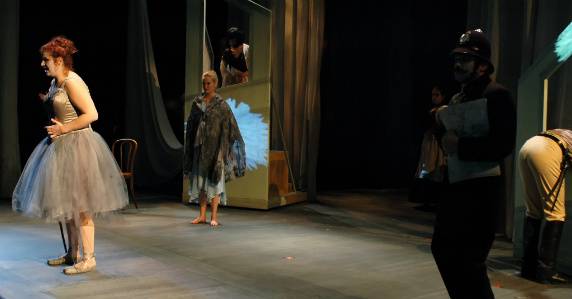
The Department of Theatre’s production of A Dream Play, brilliantly directed by Chicago’s Max Truax, is exceptional. The cast is superb, the stage setting (including the lighting, costumes, makeup, media, and set) is eerily provocative, and the music (which I’ll discuss later) is both beautiful and (yes, I’ll employ this overused word because it’s true) haunting. Indeed, everything about this play is a feast for the eyes and ears. I just said it, but it can’t be said enough, so I’ll say it again: everyone involved in the stage direction, the set, the lighting, the costumes, makeup, and sound deserves huge applause.
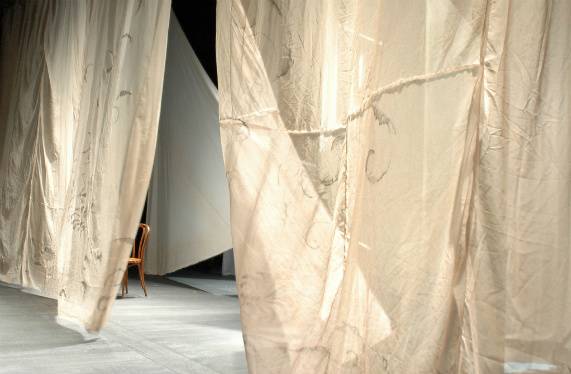
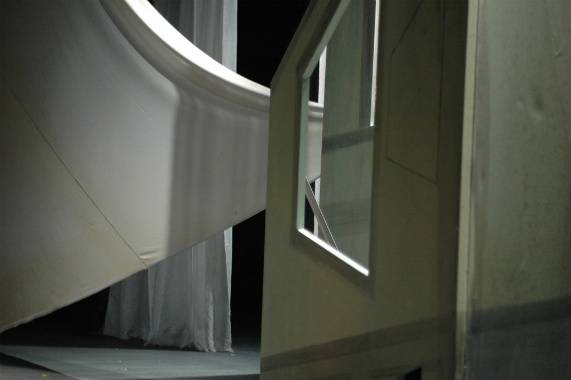
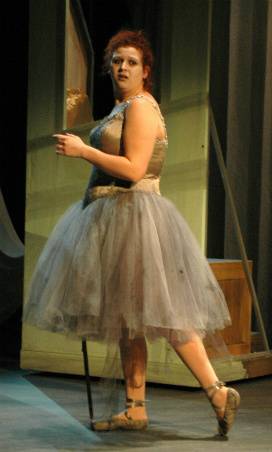
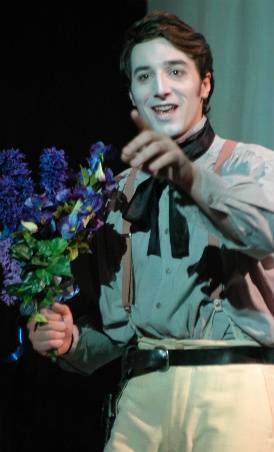
That being said, the triumph of this production lands at the feet of the entire cast. Most of the performers are charged with portraying anguish, torment, depression, and bitterness not with dialog, but rather inflection, facial expression, and body language. “It is not easy to be human,” remarks Agnes. “Hear, hear!” say the glassy-eyed, tortured souls around her, as they smile and repeat and repeat and repeat the boring, painful, mundane tasks of their boring, painful mundane “lives.” Watching them silently tell their stories is heartbreaking.
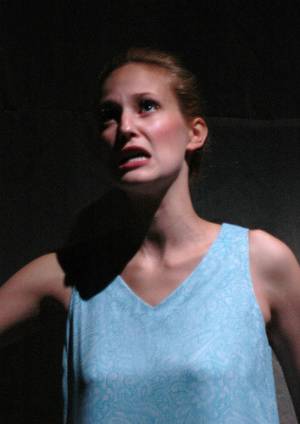 The play’s main characters are Agnes (Michelle Grube, pictured right) and Lawyer (David Monahan). I have enjoyed Michelle Grube in a previous production at the Krannert, and it was rewarding to see her progress from supporting actress to lead. Because I’m a Philistine, it took me a second or two to recognize that, what at first seems to be an overly-composed performance by Grube, is actually spot on. Agnes’ personality adjusts to her surroundings and situation, especially depending upon whether she is on Earth or not. She becomes more animated once she arrives on Earth — more human. Grube’s performance here is subtle; she assures that her differing “personalities” are perceptible without being condescendingly obvious about it.
The play’s main characters are Agnes (Michelle Grube, pictured right) and Lawyer (David Monahan). I have enjoyed Michelle Grube in a previous production at the Krannert, and it was rewarding to see her progress from supporting actress to lead. Because I’m a Philistine, it took me a second or two to recognize that, what at first seems to be an overly-composed performance by Grube, is actually spot on. Agnes’ personality adjusts to her surroundings and situation, especially depending upon whether she is on Earth or not. She becomes more animated once she arrives on Earth — more human. Grube’s performance here is subtle; she assures that her differing “personalities” are perceptible without being condescendingly obvious about it.
This play was my introduction to David Monahan, and I hope to see much more of him in the future. Monahan’s character is a gentle, intelligent man who struggles with guilt and feelings of failure. When he’s refused the expected laurels at his graduation, he finds comfort with Agnes and they marry. What follows is one of the best, most captivating portrayals of an unhappy marriage that I’ve ever witnessed. Monahan’s acting here is simply perfection. A better portrayal of a man on the verge of losing not just his temper, but his mind I’ve not seen on stage. The tension that he is able to exude in both voice and body is so thick and so dangerous that I couldn’t relax throughout the entire scene.
But Monahan would not be able to pull this scene off without Grube, who is absolutely his equal. Matching Monahan’s bristling, controlled anger with a near madness of misery, Grube also keeps the audience on the edge of its seat, tense, not breathing, frightened that she will shatter any second.
It is an anguished, relentless, enthralling scene, and they perform it without even looking at each other. I could hardly stand to watch. When the scene finally ended, I wasn’t the only audience member to finally take a grateful breath.
The music in A Dream Play could be its own character. I am not familiar with the classical music that plays before, during, and after the show (again, Philistine). Thus, I don’t know if this music was specifically chosen by Strindberg, by Truax, or by the sound designer, D.J. Puuri. Credit must be given to Puuri for executing the music so well, however. It sets the mood for the entire story. And as the tension builds, so too does the music until what we are seeing and hearing become one. I usually bring a book along to plays because I often attend them alone, and I read during the long intermissions. Not this time. The music chosen for A Dream Play is simply too splendid to be pleasant background noise. If you listen, it makes you feel wonderful and terrible at the same time. Just like the play itself.
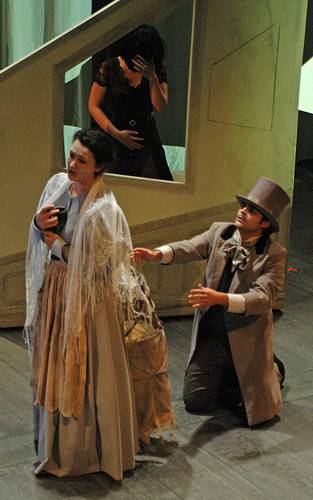 So, again, I won’t pretend that I understood the deeper meanings hidden in this play. Nor will I pretend that I completely understand the symbolism of all that paper or what is actually behind the door (though I have my ideas). August Strindberg was a troubled man, trying to escape a world in which he found no joy through “alternate states of the mind and illusion” (Hoskins). This play is one of those attempts.
So, again, I won’t pretend that I understood the deeper meanings hidden in this play. Nor will I pretend that I completely understand the symbolism of all that paper or what is actually behind the door (though I have my ideas). August Strindberg was a troubled man, trying to escape a world in which he found no joy through “alternate states of the mind and illusion” (Hoskins). This play is one of those attempts.
“Why do humans strike their friends in the face?” Agnes asks. “Because they know no better,” she’s told. But Strindberg did know better. The play he wrote is neither a “Thinking Man’s” play nor a “Madman’s” play. It is a “Mystical Man’s” play, and it could not be in better hands than in those of Max Truax and the Department of Theatre. If you’re at all interested in how a transcendental mystic sees the world, A Dream Play should not be missed.
~~*~~
Photos by Eric Ponder.
The complete text of Vicki Hoskins’ Dramaturg can be read here.
Future shows:
Wednesday–Saturday, Oct. 31–Nov. 3, 7:30 p.m.
Sunday, Nov. 4, 3:00 p.m.
Studio Theater
Program (pdf)








